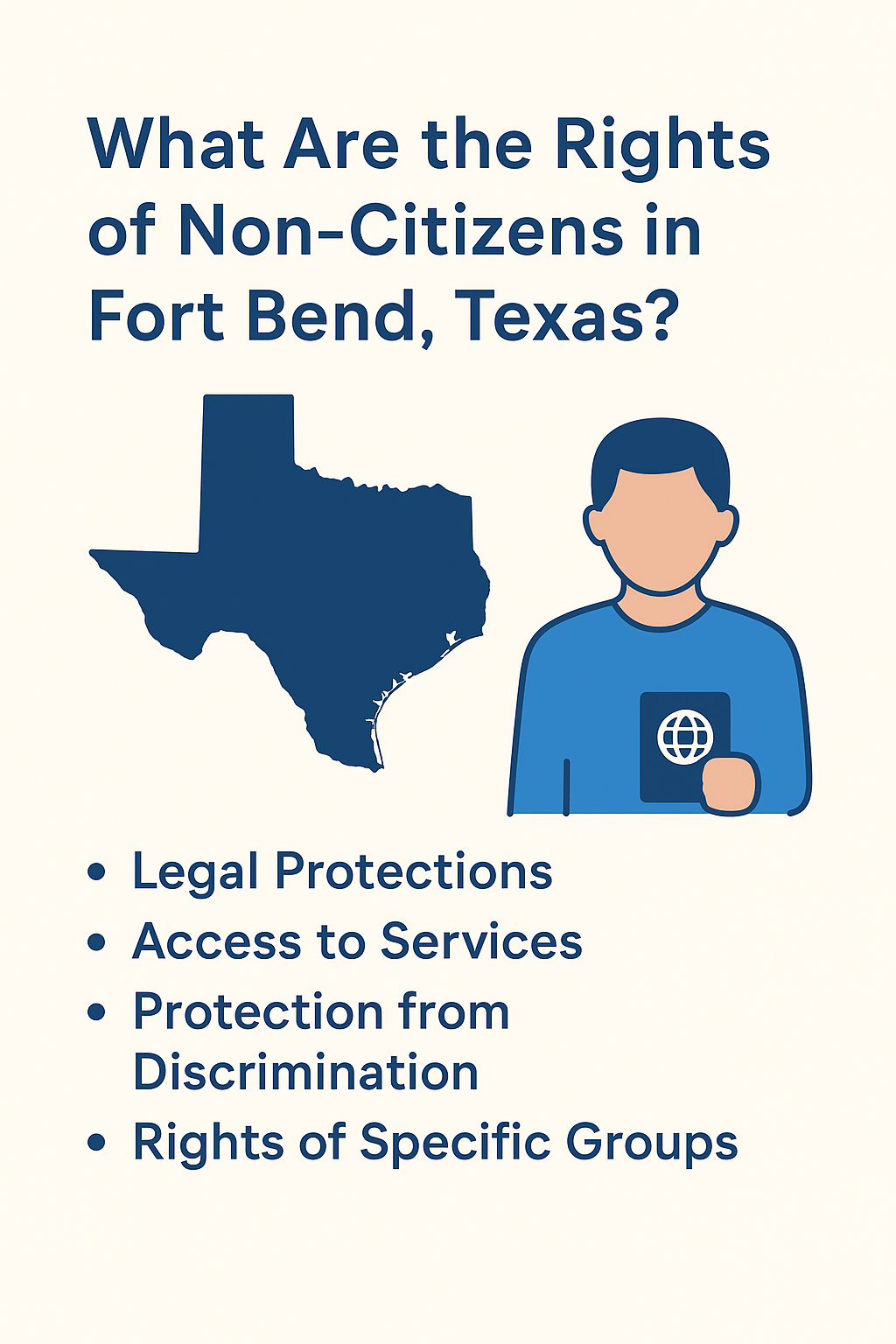
What Are the Rights of Non-Citizens in Fort Bend, Texas?
Fort Bend County, one of the fastest-growing and most diverse regions in Texas, is home to people from all walks of life, including many immigrants and non-citizens who contribute immensely to its economic, cultural, and social development. Yet, questions often arise about what rights non-citizens actually have under U.S. and Texas law.
At Mokolo Law Firm, we understand how confusing immigration and residency laws can be, especially for non-citizens trying to live, work, or raise families in Fort Bend. While U.S. citizens enjoy the full spectrum of constitutional and civil rights, non-citizens are still entitled to significant legal protections under federal and state law. Understanding these rights is essential to ensure fair treatment and avoid potential legal pitfalls.
In this article, we’ll walk you through the rights of non-citizens in Fort Bend County, discuss how local laws may impact those rights, and explain where you can seek help if you believe your rights have been violated.
1. Legal Protections for Non-Citizens in Fort Bend
Under the U.S. Constitution, non-citizens, regardless of immigration status, are entitled to certain fundamental protections. The 14th Amendment guarantees “equal protection under the law,” meaning that non-citizens cannot be discriminated against simply because of their immigration status.
These protections include:
- Right to Due Process: Non-citizens have the right to fair legal procedures before being detained, deported, or denied benefits.
- Equal Protection Clause: Local authorities cannot treat non-citizens differently from citizens without a valid legal reason.
- Access to Legal Counsel: In certain proceedings, non-citizens are entitled to seek legal advice or representation.
These rights help ensure that immigrants are treated fairly and that the justice system operates according to established constitutional principles.
2. Access to Public Services and Education
Non-citizens in Fort Bend can also access essential public services, although eligibility may depend on immigration status. For instance:
- Education: Under the landmark Supreme Court case Plyler v. Doe (1982), undocumented children have the right to free public education in the United States.
- Healthcare: Certain federally funded healthcare programs are available to immigrants who meet specific criteria.
- Legal Aid and Support Services: Non-citizens facing housing, employment, or immigration issues can receive help from local legal aid organizations.
At Mokolo Law Firm, we encourage non-citizens to stay informed about their rights and utilize the resources available to them.
3. Protection from Discrimination
Discrimination based on national origin, race, or immigration status is prohibited under both federal and Texas law. In Fort Bend, non-citizens are protected from unfair treatment in:
- Employment: Employers cannot discriminate against individuals based on their nationality or legal status (within federal guidelines).
- Housing: Landlords cannot refuse to rent to someone because they are not a U.S. citizen.
- Public Services: Non-citizens have the right to access government-funded programs without facing harassment or prejudice.
If you experience discrimination or unfair treatment, Mokolo Law Firm can help you understand your options and defend your rights.
4. Rights of Specific Groups of Non-Citizens
Non-citizens are not a single group — their rights and protections may differ depending on their legal status:
- Refugees and Asylum Seekers: Have the right to protection from persecution and must be granted fair asylum procedures.
- Permanent Residents (Green Card Holders): Enjoy nearly all the same rights as U.S. citizens, except voting in federal elections.
- Undocumented Immigrants: Though lacking legal status, they still retain basic human rights, including protection from inhumane treatment and the right to due process.
Mokolo Law Firm has extensive experience helping individuals in all these categories navigate their legal rights and responsibilities in Fort Bend County.
5. Local Resources for Non-Citizens in Fort Bend
Fort Bend has a supportive network of organizations that assist immigrants and non-citizens. Key resources include:
- Legal Aid Organizations: Provide immigration and civil rights legal assistance.
- Community Advocacy Groups: Offer educational programs, translation services, and emergency aid.
- Faith-Based and Nonprofit Agencies: Help connect immigrants with social and housing support.
Final Thoughts on What Are the Rights of Non-Citizens in Fort Bend, Texas?
Non-citizens play an essential role in shaping the culture and economy of Fort Bend County, Texas. Although they may face unique challenges, their rights are protected under U.S. and Texas law from due process and non-discrimination to access to basic public services.
However, these rights can sometimes be violated or misunderstood. That’s where our expertise comes in. At Mokolo Law Firm, we collaborate with several local organizations to ensure our clients receive both legal and community-based support.
Our legal team specializes in immigration and civil rights law, helping non-citizens understand their rights, resolve disputes, and secure legal protections.
If you are a non-citizen living in Fort Bend and need legal guidance, contact us today. Let us help you protect your rights and build a secure future in Texas.
Latest Posts
What Are the Rights of Non-Citizens in Fort Bend, Texas?
Fort Bend County, one of the fastest-growing and most diverse regions in Texas, is home to people from all walks of life, including many immigrants and...
What Are the Rights of Non-Citizens in Fort Bend County, Texas?
Fort Bend County, located in the heart of Texas, is one of the most diverse and fast-growing counties in the United States. With its rich history dating...


